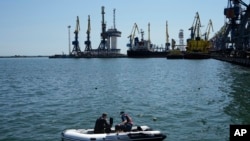Between 2016 and 2021, the number of people experiencing acute food insecurity rose from 100 million to 160 million. There are many reasons for this unwelcome change, including conflict, climate change and the COVID-19 pandemic, which caused a disruption of food supply chains, and in turn, steep inflation.
But the situation got much worse after Russian President Vladimir Putin launched a brutal war against Ukraine. His actions have caused terrible suffering in Ukraine, and have had “a devastating impact on global food security, because Ukraine is one of the breadbaskets of the world,” said Secretary of State Antony Blinken recently.
“A Russian naval blockade in the Black Sea is preventing Ukraine’s crops from being shipped to their normal destinations. There are somewhere around 20 million tons of wheat that’s trapped in silos near Odessa and in ships literally filled with grain that are stuck in the Odessa port because of this Russian blockade. Russian forces have captured some of Ukraine’s most productive farmland. They planted explosives throughout the fields. They’ve destroyed vital agricultural infrastructure.”
Speaking at a virtual roundtable discussion on “Food Security Issues Arising from Russia’s Invasion of Ukraine,” Secretary of State Blinken said that these actions are deliberate.
“President Putin is stopping food from being shipped and aggressively using his propaganda machine to deflect or distort responsibility because he hopes it’ll get the world to give in to him and end the sanctions.”
For our part, the United States has formulated an action plan that focuses on five critical lines of effort.
First, the United States is providing aid to meet urgent needs -- including more than $2.8 billion in food security and other humanitarian assistance since the start of Russia’s war against Ukraine.
Second, the United States is working with other countries to mitigate the global fertilizer shortage.
Third, we are boosting agricultural capacity and resilience through the Feed the Future initiative.
Fourth, the United States is mitigating the macroeconomic shocks of this crisis by working to increase support for financial assistance programs worldwide.
And finally, the United States will use its diplomatic resources to continually engage on this topic with partner countries, as well as with NGOs and the private sector.
“We can’t wait for President Putin to do the right thing,” said Secretary Blinken. “The rest of the world must urgently and collectively respond to the emergency.”
A Russian naval blockade in the Black Sea is preventing Ukraine’s crops from being shipped to their normal destinations. There are somewhere around 20 million tons of wheat that’s trapped in silos near Odessa because of this blockade.






